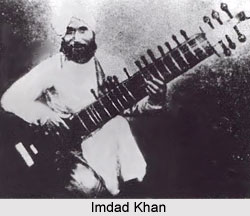 Ustad Imdad Khan was a sitar and surbahar player who was born on 1848. He had two sons Enayat Khan and Wahid Khan. His two grandsons were Vilayat Khan and Imrat Khan and his great grandsons were Shahid Parvez, Shujaat Khan, Nishat Khan, Irshad Khan, Wajahat Khan, Shafaatullah Khan and Hidayat Khan. They all have been great musical personalities and were influential in upholding the musical tradition.
Ustad Imdad Khan was a sitar and surbahar player who was born on 1848. He had two sons Enayat Khan and Wahid Khan. His two grandsons were Vilayat Khan and Imrat Khan and his great grandsons were Shahid Parvez, Shujaat Khan, Nishat Khan, Irshad Khan, Wajahat Khan, Shafaatullah Khan and Hidayat Khan. They all have been great musical personalities and were influential in upholding the musical tradition.
Although Ustad Imdad Khan, the grandfather of Ustad Imrat Khan was not actually the founder of his Gharana, he is believed to be the founder of modern day Etawa as the gharana developed much of its characteristic style during his life his life and as a result of his genius.
Imdad Khan`s father Ustad Shahbdad Khan moved the Gharana from Agra where it had been for previous generations, to Etawa. It was a peaceful village in the outskirts of Agra. It is from this time that the gharana came to be known as the Etawa Gharana. Ustad Shabdad Khan had shifted his Gharana from Agra for the sole reason of exclusively teaching his only son to become a great master of music. His wished to train his son to keep up with a legendary Pakhavaj player who was so fast that his drums would become airborne in the middle of his performances. Etawa was a calm and serene village and it is here that Imdad Khan received chilla from his father. Chilla is the law, under which a disciple may only sleep, wash, eat, meditate and practice his music without leaving the house. Ustad Imdad Khan lived in this state for twelve years.
Ustad Imdad Khan emerged as the greatest musician of his generation. He was a legendary sitar player who spread the music of his gharana through his performances and teachings in all the corners of the Indian Subcontinent. He played for Queen Victoria during her visit to India in Delhi and he was the first musician ever to be recorded by HMV the gramophone company in India. The contribution to music by this virtuoso is phenomenal, including the creation and development of two novel instruments, the Surbahar and Sursagar. Many of his compositions are still played today as are the techniques he evolved for the right and left hands.




















